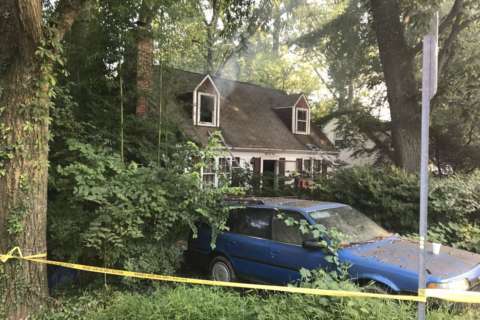A Montgomery County man convicted in the 2017 fire death of a 21-year-old who was helping him secretly dig tunnels under his Bethesda, Maryland, home must serve nine years in prison.
In April, a jury found Daniel Beckwitt, 28, guilty of second-degree murder and involuntary manslaughter in the September 2017 death of Askia Khafra.
The 21-year-old had been digging tunnels under Beckwitt’s house for an underground bunker — intended for surviving a nuclear attack — when a fire broke out in the home, which was littered with garbage. Khafra was unable to escape.
The victim had worked in the tunnels for days at a time, eating and sleeping in there. The tunnels had lights, an air circulation system and a heater.
Khafra’s family had urged Circuit Judge Margaret Schweitzer to give Beckwitt the maximum penalty — 30 years in prison. During victim-impact statements, Khafra’s parents described the agony of losing their child.
“Askia’s death has left me broken,” mother Claudia Khafra said. “I am constantly plagued by feelings of emptiness.”
Beckwitt nodded and wiped his eyes with a tissue as he listened.
“Let him feel a fraction of the pain he’s imposed — not just on Askia, but on the entire family,” said the victim’s brother.
Beckwitt’s attorney, Robert Bonsib, said his client’s failure was in having a garbage filled home with no emergency routes.
“He is not this demon,” Bonsib said. “This is not a case where someone went out and shot someone in the head. This is a failure to clean up the house. That’s what he’s on trial for.”
In total, Beckwitt was sentenced to 21 years, but Schweitzer suspended all but nine years of the sentence — followed by five years of supervised probation. Sentencing guidelines had called for a prison term of 10 to 21 years. Beckwitt will be able to appeal for parole after serving 4 1/2 years.
The judge indicated that the case was closer to an involuntary manslaughter than a murder, but said she couldn’t ignore the jury’s verdict. She told Khafra’s parents the length of Beckwitt’s prison sentence doesn’t equate with their loss. “My sentence will not and cannot give you justice,” she told them.
In addressing Beckwitt, the judge described how his hubris contributed to Khafra’s death.
“You thought everything would be OK because you’re very smart,” the judge told Beckwitt. “Your intellectual arrogance and self-interest caused you to fail to see what common sense would tell you was a dangerous situation.”
During Beckwitt’s trial, Montgomery County prosecutor Marybeth Ayres accused Beckwitt of recklessly endangering Khafra’s life, saying he sacrificed safety for secrecy.
Jurors heard how Beckwitt tried to trick Khafra into thinking they were digging tunnels by having him don “blackout glasses” before taking him on a long drive and then delivering him to the secret location.
Hours before the fire broke out in the basement, Khafra texted Beckwitt to warn him it smelled like smoke in the tunnels. Ayres said Beckwitt didn’t respond for more than six hours before telling Khafra that there had been a “major electrical failure.” Instead of getting Khafra out of the tunnels, Beckwitt told him that he “just switched it all over to another circuit,” according to the prosecutor.
Bonsib said that the fire was an accident, not a crime. He also said his client had screamed for help from neighbors after the fire broke out and tried to rescue his friend from the blaze before heavy smoke and flames forced him to retreat.
The attorney described Beckwitt as a “very strange young man” whose only friends are online. Nobody from Beckwitt’s family was in court to support him, he said.
“Being different, living in a different circumstance, is not a crime,” Bonsib contended.
Last week, a judge refused to order a new trial for the wealthy stock trader, who had argued that jurors had insufficient evidence to convict.
Beckwitt did not testify at his trial, which lasted nearly two weeks. But in a statement to the court Monday before sentencing, he expressed remorse.
“I’m sorry for what happened but sorry doesn’t scratch the surface,” he said. “… Sorry is what you say when you bump into someone. If there was something I could do to bring Askia back, I would jump at it. I truly tried to rescue Askia. I had no reason to wish for Askia’s demise.”
Beckwitt however, would not ask for forgiveness. Instead, he asked to be viewed as “an imperfect human being” rather than as a “wicked monster.”
“I don’t feel it would be appropriate for me to beg for mercy,” he said.
The Associated Press and WTOP’s Jack Pointer contributed to this report.







